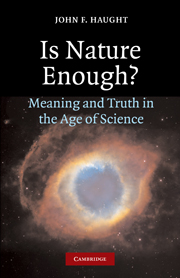6 - Purpose
Published online by Cambridge University Press: 05 June 2012
Summary
I sing the goodness of the Lord
That filled the earth with food;
He formed the creatures with his word
And then pronounced them good.
Isaac Watts, 1715Is it the goodness of the Lord
That fills the earth with food?
Selection has the final word
And what survives is good.
Kenneth E. Boulding, 1975In contemporary conversations about the relationship of religion to science two questions stand out: is nature all there is? And does the universe have a purpose? The two issues are inseparable. For if nature is all there is, there could be no overall purpose to the universe. That is, there could be no goal beyond nature toward which the long cosmic journey would be winding its way. But if the logic here is correct, then the detection of an overarching purpose in nature would imply that nature is not all there is. In the broadest sense purpose means “directed toward a goal or telos.” The question before us, then, is whether the cosmos as a whole is teleological, that is, goal-directed. Is there perhaps a transcendent goodness luring it toward more intense modes of being and ultimately toward an unimaginable fulfillment? How can we find out?
If cosmic purpose were to manifest itself palpably anywhere in nature, would it not be in the life-world? Yet contemporary biology finds there only an apparent purpose. Scientists, for the most part, seem to agree that there is indeed a kind of purposiveness, or teleonomy, in living phenomena.
- Type
- Chapter
- Information
- Is Nature Enough?Meaning and Truth in the Age of Science, pp. 98 - 116Publisher: Cambridge University PressPrint publication year: 2006



